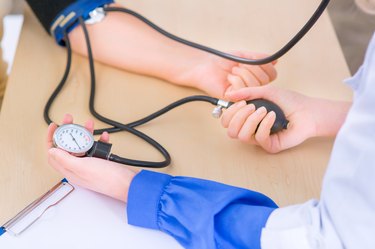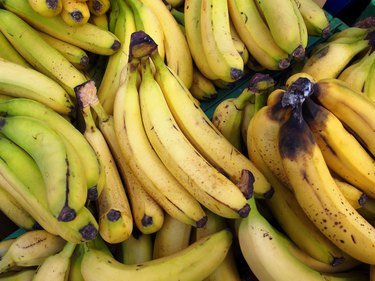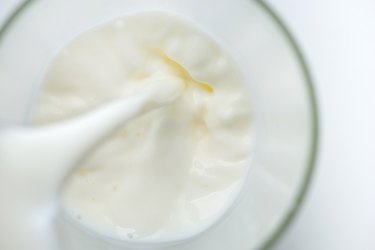
Your doctor may prescribe a diuretic if you have high blood pressure or a disease involving your heart, kidneys or liver. Diuretics cause your kidneys to eliminate excess water and sodium through your urine. In addition to water and sodium, some diuretics can affect your body's level of potassium, calcium and magnesium, according to MyOptumHealth.com. If you have been prescribed a diuretic, you should pay special attention to these minerals and check with your doctor before consuming alcohol.
Low-Sodium Foods
Video of the Day
Instead of eating high-sodium foods, you should focus on eating fresh fruits, vegetables, unsalted meats and low-fat dairy products. Eating food containing too much sodium can reduce the effectiveness of your diuretic, states the American Heart Association. Most of the sodium in your diet comes from commercially processed foods and meals prepared in restaurants. High sodium foods to avoid include canned soups and vegetables, commercially prepared sauces, smoked and cured foods such as pickles, olives, sauerkraut, bacon, beef jerky and herring, all cheeses, buttermilk, salted snack foods, most dry cereals, tomato juice and bouillon.
Video of the Day
Potassium-Rich Foods

You need a proper balance of potassium for your heart, muscles and nervous system to function properly. Some diuretics cause your body to lose too much potassium. High potassium foods include potatoes, bananas, oranges, prunes, raisins, apricots peaches, tomatoes, Brussels sprouts, spinach, dried beans, peas and nuts. You should consume three to five servings of fresh vegetables and two to four servings of fresh fruit every day. Before increasing the potassium in your diet, check with your doctor about the type of diuretic prescribed. Diuretics called potassium-sparing diuretics prevent your body from eliminating too much potassium, as compared with regular diuretics. If you are taking a potassium-sparing diuretic, you should avoid consuming too much potassium.
Foods with Calcium and Magnesium

Long-term use of loop diuretics can cause your body to lose calcium. You need calcium for strong bones, teeth and good health. Check with your doctor to see whether you are taking a loop diuretic. High-calcium foods include milk, yogurt, low-sodium cheese, calcium-fortified orange juice and firm tofu.
Diuretics can also cause your body to lose magnesium, so be sure to include the essential mineral in your diet. Magnesium-rich foods include nuts, seeds, beans, spinach and brown rice.